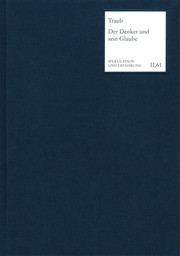Detailansicht
Der Denker und sein Glaube
eBook - Fichte und der Pietismus oder: Über die theologischen Grundlagen der Wissenschaftslehre. Mit einer Übersetzung von Fichtes >Theologia dogmatica secundum Theses D. Pezoldi< von Christian Reindl
ISBN/EAN: 9783772833328
Umbreit-Nr.: 8669962
Sprache:
Deutsch
Umfang: 658 S., 5.26 MB
Format in cm:
Einband:
Keine Angabe
Erschienen am 01.01.2020
Auflage: 1/2020
E-Book
Format: PDF
DRM: Digitales Wasserzeichen
€ 128,00
(inklusive MwSt.)
Sofort Lieferbar
- Zusatztext
- Erstmals in der Fichte-Forschung legt Traub den Einfluss pietistischen Gedankenguts auf Fichtes Philosophie und dessen akademisches und politisches Selbstverständnis dar. Belege dafür sind etwa Fichtes Befürworten einer Personalisierung und Popularisierung des Glaubenswissens, die Innerlichkeitskultur moraltheologischer und rationaler Selbstprüfung oder der Primat der »praxis pietatis«. Im Zentrum steht die Analyse der kaum beachteten konfessionellen Aspekte von Fichtes Bildungsbiographie: in Herkunftsmilieu, Schule und Universität. Besonders mit Fichtes frühen Arbeiten zur Dogmatik und Christologie weist Traub nach, dass Fichte weit vor seiner Kant-Lektüre über eine konfessionell geprägte theologisch-philosophische Orientierung verfügte, die jedes angemessene Verständnis seiner späteren Philosophie berücksichtigen muss. For the first time in Fichte scholarship, Traub offers an account of the influence of pietistic ideas on Fichte's philosophy and his academic and political self-image. Evidence of this is, for example, Fichte's personalisation and popularisation of the knowledge of faith, the culture of internal moral theological and rational self-examination, or the primacy of »praxis pietatis«. The analysis focuses on the little investigated denominational aspects of Fichte's early education: in his family and upbringing, in school and university. Especially with Fichte's early work on Dogmatics and Christology, Traub proves that Fichte's theology and philosophy had - far before reading Kant - a firm denominational orientation that must be taken into account for any appropriate understanding of his later philosophy.
